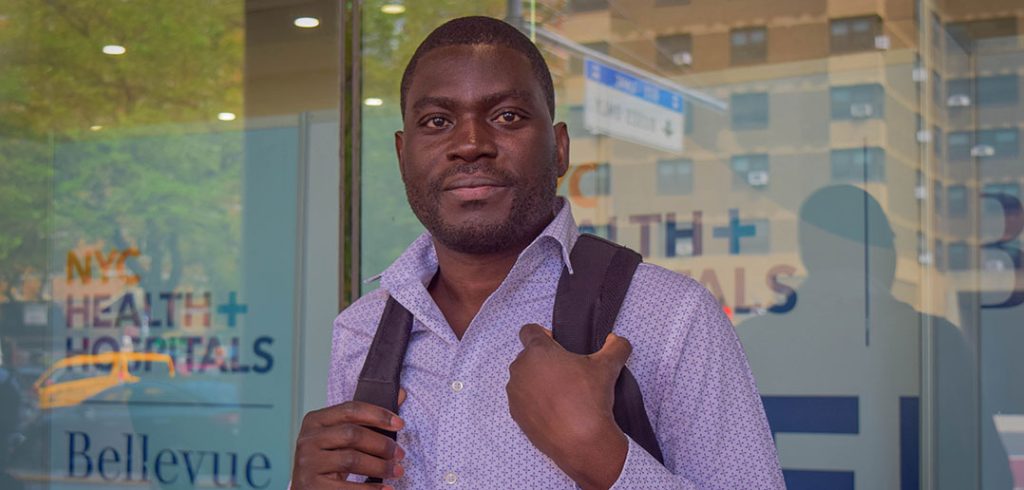Education—and the mental and physical doors it opens—have always inspired Fordham social work student Salif Zongo to keep learning. Growing up in a small town in the Koudougou region of Burkina Faso, West Africa, Zongo walked nearly nine miles barefoot to get to school, sometimes fording a nearby flooded river to return home. This spring, he’ll graduate from Fordham’s Graduate School of Social Service with a master’s degree in social work.
Education is a rare privilege in his hometown, and many students quit because it’s too challenging to get to school, but Zongo persisted because he believes knowledge is a potent tool, he said.
From Burkina Faso to Manhattan: A Long Journey for Higher Education
“School for me is like a vessel of knowledge,” Zongo said. “School is something that I always look up to, to have a place where people can better themselves and learn and grow and even possibly learn about the world and different things in life.”
Zongo was accepted to the University of Ouagadougou, in Burkina Faso’s capital, but couldn’t start the program because of a lack of funding and study materials. In 2013, he came to the U.S. on a Diversity Immigrant Visa—a lottery-selected program available to people from countries with low U.S. immigration rates. Looking back now, Zongo says his journey to Fordham feels like a dream.
When he arrived in the U.S., Zongo spoke three languages—French and two local languages, Moore and Dioula—but not English. After struggling to find enough work, he enrolled in remedial English at John Jay College, where he eventually earned his bachelor’s degree in International Criminal Justice, graduating cum laude in 2018.
Understanding Vulnerable Communities
Zongo’s background and experiences prepared him well to become a social worker, and left him with an intrinsic desire to help others and to give back, said Linda White-Ryan, associate dean of GSS.
“It gave him an in-depth understanding of many of the vulnerable communities, the people that social workers assist,” White-Ryan said.
While at John Jay, Zongo also received the prestigious DAAD scholarship to study at the Berlin School of Economics and Law. He now speaks five languages, adding German and English to his repertoire.
After graduating, he worked in various community organizations helping vulnerable New Yorkers access services and health care. In 2021, he received the Mayor’s Graduate Scholarship—which encourages full-time NYC government employees to pursue higher education—and enrolled in Fordham’s MSW program.
Working with Undocumented and Unhoused New Yorkers
The program’s helped him hone his skills and passion for helping the city’s underserved communities. While at Fordham, Zongo worked full-time as a Community Health Worker at Bellevue Hospital, an outgrowth of the contact tracing work he did through the Public Health Corps early in the pandemic. His job is to help social workers and doctors make sure they’re offering complete services to patients.
“As a CHW, my role is to effectively interact with undocumented and homeless people and to identify complex barriers to primary care,” Zongo said. “My second role is to provide formal, trauma-informed care tailored to the patient-oriented care goals while addressing substance use, mental health, housing progression, and chronic disease.”
At Fordham, Zongo’s particularly enjoyed the humanitarian and mental health classes he’s taken, including his Integrated Behavioral Health, Health Care Policy and Advocacy, and Suicide Assessment and Treatment classes, because they’ve bolstered his cultural understanding and prepared him to better serve people he works with in the future.
“He’s developed a very strong skill base and developed social work competency at a really superior level,” White-Ryan said. “We are proud he’s a graduate of Fordham…he’s a shining example of this program.”
After graduation, Zongo will continue in his Community Health Worker position and study toward a Master of Public Health degree at Columbia University this fall. He plans to spend his life making sure overlooked and underserved populations have access to good health care.
—Meredith Lawrence


